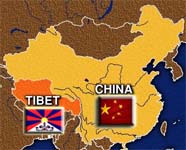China, exiles mark 50 years of communist rule in Tibet
 Beijing - The Chinese government and Tibetan exiles on Friday marked the 50th anniversary of communist rule over Tibet with very different slants on the region's history.
Beijing - The Chinese government and Tibetan exiles on Friday marked the 50th anniversary of communist rule over Tibet with very different slants on the region's history.
Communist Party officials and state-approved Tibetan Buddhist leaders held a seminar in Beijing to celebrate "Serfs Emancipation Day," a newly decreed public event that officially falls on Saturday.
"Tomorrow sees the 50th anniversary of the democratic reform of Tibet, when about 1 million serfs in the region were freed," said a commentary by the state-run China Tibet Information Centre.
Indian-based Tibetan exiles said they planned a protest on Saturday in Dharamsala, the seat of the Tibetan government-in-exile, against "50 years of Chinese oppression" in Tibet.
"Serfs Emancipation Day is a blatant propaganda ploy by the Chinese government to convince the world that Tibetans are happy under Chinese rule," Tenzin Choedon of Students for a Free Tibet said in a statement from Dharamsala.
"This day has been declared a new holiday by the Chinese government to propagate the lie that the Tibetans 'welcomed' China's invasion and occupation of Tibet," the statement said.
For the month preceding Saturday's anniversary, paramilitary police have sealed off almost all Tibetan areas of China to foreign journalists and tourists and cut off some text messaging and other mobile telephone services.
The crackdown came amid reports of several small protests and a civil disobedience campaign by Tibetans around the 50th anniversary of a failed uprising against Chinese rule.
Since the uprising, which began March 10, 1959, an estimated 1 million Tibetans "have lost their lives, countless have been arbitrarily imprisoned, cultural and religious institutions have been decimated, and Tibet's fragile environment has been irrevocably damaged," Students for a Free Tibet said Friday.
The exiled Dalai Lama, the highest leader of Tibetan Buddhism, recently said Tibetans in China were living in a "hell on earth."
But China continued to accuse the Dalai Lama of promoting a return to a "feudal theocracy" and fighting for Tibetan independence despite his frequent statements that he seeks only greater autonomy for Tibetans within China.
The China Tibet Information Centre published a photograph of Jia Qinglin, the official number four in the Communist Party, shaking hands with the state-approved 11th Panchen Lama at the Beijing seminar on Friday.
The Panchen Lama, 19-year-old Gyaincain Norbu, this week urged Tibetans to support the Communist Party's "democratic reform to end the feudal serfdom system."
"As facts have showed, Tibet could only achieve today's prosperity and development as well as a more beautiful future under the leadership of the Communist Party of China," he said in a commentary in the People's Daily, the party's official newspaper.
The reincarnate Panchen Lama is often considered second in importance to the Dalai Lama by Tibetan Buddhists.
China's 11th Panchen Lama was chosen in 1995 by state-sponsored Tibetan Buddhist leaders.
He was scheduled to attend Saturday's opening of the state-sponsored World Buddhist Forum in the eastern Chinese city of Wuxi, an event to which the Dalai Lama is not invited.
A rival 11th Panchen Lama, chosen and recognized by supporters of the Dalai Lama, has reportedly been held under virtual house arrest in China since he was 6 years old. (dpa)